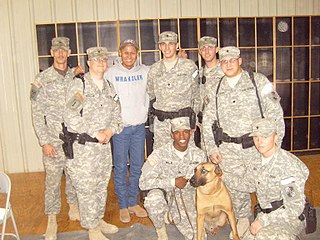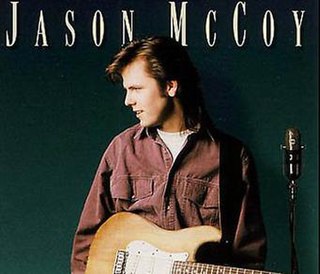
"(If You're Not in It for Love) I'm Outta Here!" is a song co-written and recorded by Canadian country music singer Shania Twain. It was released in November 1995 as the fourth single from her album The Woman in Me. The song was written by Mutt Lange and Twain. The song became Twain's second number-one hit at country radio, and the first single to be promoted with three different mixes worldwide to cater to international genre demand. It spent two weeks at the top of the chart in February 1996. The song was also her breakthrough hit in Australia. "(If You're Not in It for Love) I'm Outta Here!" was later included on Twain's 2004 Greatest Hits package. In 1997, the eurodance group Real McCoy covered "I'm Outta Here!".
"You Can't Lose Me" is a song written by Trey Bruce and Thom McHugh, and recorded by American country music artist Faith Hill. It was released in April 1996 as the fourth single from her album It Matters to Me. It reached a peak of #6 on the Hot Country Songs charts in 1996, although it was a Number One on the RPM Top Country Tracks charts in Canada.

"Little Bitty" is a song written by Tom T. Hall, and recorded by American country music artist Alan Jackson. It was released in October 1996 as the lead-off single to Jackson's fifth studio album Everything I Love. The song reached the top of the U.S. Billboard country music charts in December of that year, becoming his fourteenth Number One on that chart. It also reached number-one on the Canadian RPM Country Tracks and peaked at number 58 on the U.S. Billboard Hot 100 chart, making it a minor crossover hit.

"Wink" is a song written by Bob DiPiero and Tom Shapiro, and recorded by American country music singer Neal McCoy. It was released in April 1994 as the second single from his album No Doubt About It. Also the second consecutive Number One from that album, "Wink" spent four weeks at the top of the Billboard Hot Country Singles & Tracks chart in June and July of that year. In 1996, the song received the Robert J. Burton award from Broadcast Music Incorporated for being the most-performed country song of the year.
"They're Playin' Our Song" is a song written by Bob DiPiero, John Jarrard and Mark D. Sanders, and recorded by American country music singer Neal McCoy. It was released in April 1995 as the second single from his album You Gotta Love That. The song peaked at number 3 on the U.S. Hot Country Singles & Tracks chart and at number 8 on the RPM Country Tracks in Canada.

The discography of Neal McCoy, an American country music singer, consists of ten studio albums, two compilation albums and 34 singles. Of his singles, "No Doubt About It" and "Wink" both reached number one on the Billboard country charts, and seven more reached top ten. His albums No Doubt About It and You Gotta Love That are both certified platinum by the Recording Industry Association of America (RIAA), and his 1996 self-titled album is certified gold.

"She's Every Woman" is a song written by Victoria Shaw and Garth Brooks, and recorded by Brooks. It was released in August 1995 as the first single from the album Fresh Horses. It was a Number One hit on the Billboard Hot Country Singles & Tracks charts in October 1995, becoming his 14th Number One on that chart.
"Then You Can Tell Me Goodbye" is a song written by John D. Loudermilk. It was first released in 1962 by Don Cherry, as a country song and again as a doo-wop in 1967 by the group The Casinos on its album of the same name, and was a number 6 pop hit that year. The song has since been covered by Eddy Arnold, whose version was a number 1 country hit in 1968, and by Neal McCoy, whose version became a Top 5 country hit in 1996.
"This Used to Be Our Town" is a single by Canadian country music artist Jason McCoy. Released in 1995, it was the fourth single from his album Jason McCoy. The song reached #1 on the RPM Country Tracks chart in July 1995.
"Learning a Lot About Love" is a single by Canadian country music artist Jason McCoy. Released in 1995, it was the fifth single from his album Jason McCoy. The song reached #1 on the RPM Country Tracks chart in November 1995.
"Candle" is a single by Canadian country music artist Jason McCoy. Released in 1995, it was the sixth single from his album Jason McCoy. The song reached #1 on the RPM Country Tracks chart in March 1996.

"The Shake" is a song written by Jon McElroy and Butch Carr, and recorded by American country music artist Neal McCoy. It was released May 1997 as the only single from McCoy's Greatest Hits album. The song reached number 5 on the Billboard Hot Country Singles & Tracks chart in October 1997. It peaked at number 7 on the Canadian RPM Country Tracks.
"You Gotta Love That" is a song written by Jess Brown and Brett Jones, and recorded by American country music artist Neal McCoy. It was released in January 1996 as the fourth single from his album You Gotta Love That. The song reached number 3 on the Billboard Hot Country Singles & Tracks chart in April 1996.
"For a Change" is a song written by John Scott Sherrill and Steve Seskin, and recorded by American country music artist Neal McCoy. It was released in December 1994 as the first single from his album You Gotta Love That. The song reached number 3 on the U.S. Billboard Hot Country Singles & Tracks chart and peaked at number 8 on the RPM Country Tracks in Canada.
"The City Put the Country Back in Me" is a song written by Mike Geiger, Woody Mullis and Michael Huffman, and recorded by American country music artist Neal McCoy. It was released in July 1994 as the third single from his album No Doubt About It. The song reached number 5 on the U.S. Billboard Hot Country Singles & Tracks chart and number 11 on the RPM Country Tracks chart in Canada.
"Born Again in Dixieland" is a song co-written and recorded by Canadian country music artist Jason McCoy. Released in June 1997, it was the lead single from his album Playin' for Keeps. The song reached #3 on the RPM Country Tracks chart in September 1997. The song won a SOCAN Song of the Year award.
"If You Can't Be Good " is a song written by Troy Seals and Blue Miller, and recorded by American country music artist Neal McCoy. It was released in October 1997 as the first single from the album Be Good at It. The song reached #22 on the Billboard Hot Country Singles & Tracks chart.
"A Little Bit of You" is a song recorded by Canadian country music artist Jason McCoy. It was released in 1998 as the third single from his third studio album, Playin' for Keeps. It peaked at number 3 on the RPM Country Tracks chart in April 1998.
"I'm Gonna Make Her Mine" is a song recorded by Canadian country music artist Jason McCoy. It was released in 1998 as the fourth single from his third studio album, Playin' for Keeps. It peaked at number 15 on the RPM Country Tracks chart in August 1998.
"Kind of Like It's Love" is a song recorded by Canadian country music artist Jason McCoy. It was released in 2000 as the first single from his fourth studio album, Honky Tonk Sonatas. It peaked at number 3 on the RPM Country Tracks chart in September 2000.







